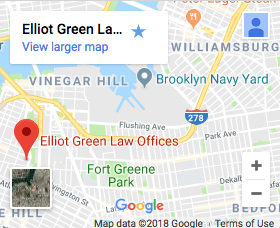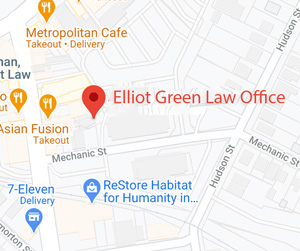When it comes time to draft a parenting plan outlining parenting time and decision-making during a Brooklyn, New York divorce, parents will often encounter the concept of the “best interest of the child.” The best interest of the child standard is not a fixed concept, but rather a set of guidelines the courts are instructed to use when parents cannot reach a decision about where children will reside, how parenting time will be split, and how decision making for the children will be made. As a general rule, it is usually in your best interests to resolve your child custody questions outside of court with the assistance of the family lawyers at the Elliot Green Law Offices. The child custody attorneys at the Elliot Green Law Offices can work with you to help you make decisions outside of court. Taking a child custody battle to court can be risky because what a judge might believe is in the best interests of your child might not be what you believe is in the best interests of your child. Sometimes parents find themselves having to accept decisions neither parent wants. Changing a parenting plan after a judge approves it can also be very difficult unless circumstances have significantly changed.
Parents who can resolve their custody disputes outside of court or through mediation have the most say in how their parenting plan will look. However, there are cases where parents may need to take a custody dispute to court. If your spouse was violent or abusive, sometimes a child custody battle must be taken to court. When a judge looks at a child custody dispute, he or she will use the best interest of the child standard to make decisions about where the child will live, how visitation will be arranged, and how decision making will go.
Best Interest of the Child: Factors a Judge Can Consider
When making child custody decisions, a judge will look at several factors. Each judge may weight each factor differently. According to the New York State Unified Court System, there is no single standard a judge will consider when making child custody decisions. Because there is no single standard definition for the best interest of the child, in certain cases it can be difficult for your divorce lawyer to predict the outcome of taking your child custody battle to court. However, based on these factors, parents can prepare a stronger case so that they can meet their goals. Here are some things a judge might ask or consider.
- Which parent has been the child’s primary caregiver? The courts will generally look to maintain a stable situation for the child. Proving that you are the child’s primary caregiver can help you make a stronger case that your child should live with you. If you are the parent who drops your child off at school and picks him or her up, find ways to document this. If you are the parent who feeds, bathes, and clothes your child, proving this in court will be essential to show that you are the primary caregiver. If you are the parent who helps your child with homework, takes him or her to play dates, and generally is the main caregiver in charge of your child’s wellbeing, document this to show the court.
- Stability. The parent who can provide the child with the most stability might also get preference. Will your child be able to stay in the same school if he or she lives with you? Can you offer a stable home environment for your child?
- Parenting skills. The court will look at each parent’s skills and resources and may award custody to the parent who appears to have the best parenting skills. Think about the basics: cooking healthy meals, seeing to it that your child gets to bed on time and to school on time, and helping your child maintain a healthy and active life.
- Health. The court may look at your physical and mental health when making child custody decisions. While the court isn’t allowed to discriminate against parents with disabilities, the court may give preference to a parent who has the physical and mental capacity to best provide for the child’s needs.
- Drugs and alcohol. Parents with a past history of drug or alcohol abuse may not receive preference when it comes to custody decisions.
- Domestic violence. A parent with a history of domestic violence, a restraining order, or criminal record may not get primary custody of the child or may be subject to supervised visitation.
- Failure to exercise visitation rights. Parents who arrive late to visitation times or those who fail to take advantage of their visitation rights may not get custody in a custody battle and visitation time may be limited in a parenting plan.
- Financial stability of the parents. Financial stability may be a consideration in a child custody battle. If one parent cannot afford a stable home or afford food, this could impact a judge’s decision.
- Siblings. The courts may consider where the child’s siblings, friends, and extended family live. The goal of the courts is to provide as stable a situation for the child as possible. If one parent lives close to grandparents or lives with a child’s extended family, this parent may get preference.
- Parents’ willingness to encourage the child’s relationship with the other parent. While it is understandable that a parent will want to protect his or her child from a parent with a substance abuse problem or a history of violence, in general, the courts look favorably upon parents who encourage the child to have a relationship with both parents.
- The child’s desires. If a child is old enough to state his or her preference, his preference may be considered in a child custody case.
These are some factors the courts will consider in a child custody case. Fortunately, many cases don’t go to court and most parents are able to resolve their custody disputes outside of court with the help of the child custody lawyer in Brooklyn, New York, at the Elliot Green Law Offices. However, if your child custody dispute looks like it will go to court, there are steps you can take to make the strongest possible case for child custody. For example, establishing that you have been the child’s primary caregiver, showing that you can provide a stable and healthy home environment, and documenting all of this can be incredibly helpful in a child custody battle. If you are facing a child custody battle, contact the Elliot Green Law Offices, child custody lawyers in Brooklyn, New York today. Our firm may be able to help you gather documentation and build the strongest possible case to help you maintain custody of your children.



